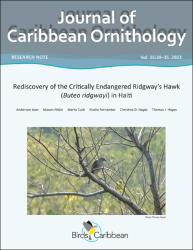Mostrar el registro sencillo del ítem
Rediscovery of the critically endangered Ridgway’s Hawk (Buteo ridgwayi) in Haiti
| Licencia | Open Access article distributed under the Creative Commons Attribution License (creativecommons.org/licenses/by/3.0/), which permits unrestricted use, distribution, and reproduction, provided the original work is properly cited. | es |
| Autor | Jean, Anderson | |
| Autor | Fildor, Maxon | |
| Autor | Curti, Marta | |
| Autor | Fernández, Eladio | |
| Autor | Hayes, Christine D. | |
| Autor | Hayes, Thomas I. | |
| Fecha de admisión | 2023-06-07T23:40:41Z | |
| Fecha disponible | 2023-06-07T23:40:41Z | |
| Año | 2023 | |
| Citación | Jean, A., Fildor, M., Curti, M., Fernandez, E., Hayes, C. D., & Hayes, T. I. (2023). Rediscovery of the critically endangered Ridgway’s Hawk (Buteo ridgwayi) in Haiti. Journal of Caribbean Ornithology, 36, 30-35. Recuperado de: | es |
| URI | https://bvearmb.do/handle/123456789/2818 | |
| Sinopsis | [English] he Ridgway’s Hawk (Buteo ridgwayi) is a Critically Endangered, diurnal bird of prey endemic to the Caribbean island of Hispaniola and some satellite islands. This hawk was once distributed in lowland habitats across the island, which includes the countries of Haiti and the Dominican Republic. However, its population has declined over the past century and it was believed to have been extirpated from Haiti nearly 60 yr ago. Here we report the first documented sighting of Ridgway’s Hawk on Les Cayemites, Haiti in over 100 yr and the first sighting in Haiti since 1962. This short note describes our initial rediscovery of the hawk in 2019 and our subsequent field surveys in 2020 and 2021. Given the importance of Les Cayemites to the Ridgway’s Hawk population in Haiti in the past and the results of our recent surveys, we propose that this region be considered an Important Bird Area under Criterion A1. We also recommend that any conservation program for Ridgway’s Hawk in Haiti include community development with the goal to decrease human pressure on native wildlife. | es |
| Sinopsis | [Español] Redescubrimiento de Buteo ridgwayi, en peligro crítico de extinción en Haití • Buteo ridgwayi es una rapaz diurna en peligro crítico de extinción, endémica de la isla caribeña de La Española y algunas islas satélite. Antaño, este gavilán estuvo distribuido en hábitats de tierras bajas por toda la isla, que incluye los países de Haití y República Dominicana; sin embargo, su población ha disminuido durante el pasado siglo y se creía que había sido extirpado de Haití hace casi 60 años. Aquí informamos el primer avistamiento documentado de esta especie en Les Cayemites, Haití, en más de 100 años, y el primer avistamiento en Haití desde 1962. Esta nota corta describe nuestro redescubrimiento inicial del gavilán en 2019 y nuestros muestreos de campo posteriores en 2020 y 2021. Dada la importancia de Les Cayemites para la población B. ridgwayi en Haití en el pasado, y los resultados de nuestros recientes muestreos, proponemos que esta región se considere un Área Importante para las Conservación de las Aves según el Criterio A1. También recomendamos que cualquier programa de conservación para esta rapaz en Haití incluya el desarrollo comunitario con el objetivo de reducir la presión humana sobre la vida silvestre nativa. | es |
| Idioma | English | es |
| Publicado | Journal of Caribbean Ornithology, 36, 30-35 | es |
| Derechos | © 2023 Jean et al.; licensee BirdsCaribbean. | es |
| URI de derechos | http://creativecommons.org/licenses/by/3.0/ | es |
| Materia | Biodiversidad | es |
| Materia | Hábitats y especies | es |
| Materia | Especies amenazadas o en peligro de extinción | es |
| Título | Rediscovery of the critically endangered Ridgway’s Hawk (Buteo ridgwayi) in Haiti | es |
| dc.identifier.doi | https://doi.org/10.55431/jco.2023.36.30-35 | |
| Tipo de material | Article | es |
| Tipo de contenido | Scientific research | es |
| Acceso | Open | es |
| Audiencia | Technicians, professionals and scientists | es |
Ficheros en el ítem
Este ítem aparece en la(s) siguiente(s) colección(es)
-
Investigación ambiental [1698]
La consulta y descarga de este documento están sujetas a esta licencia: Open Access article distributed under the Creative Commons Attribution License (creativecommons.org/licenses/by/3.0/), which permits unrestricted use, distribution, and reproduction, provided the original work is properly cited.
© 2023 Jean et al.; licensee BirdsCaribbean.
© 2023 Jean et al.; licensee BirdsCaribbean.


